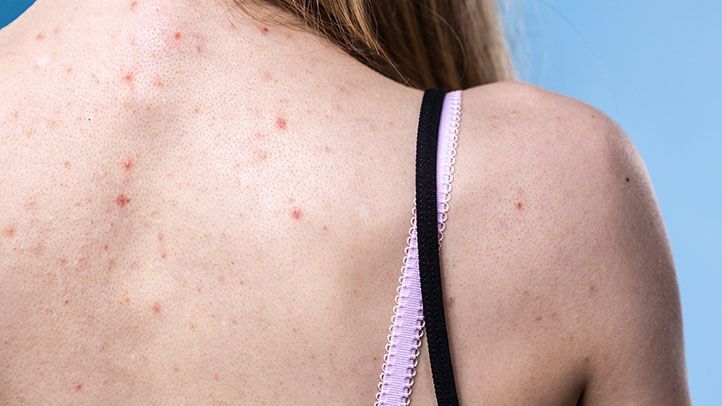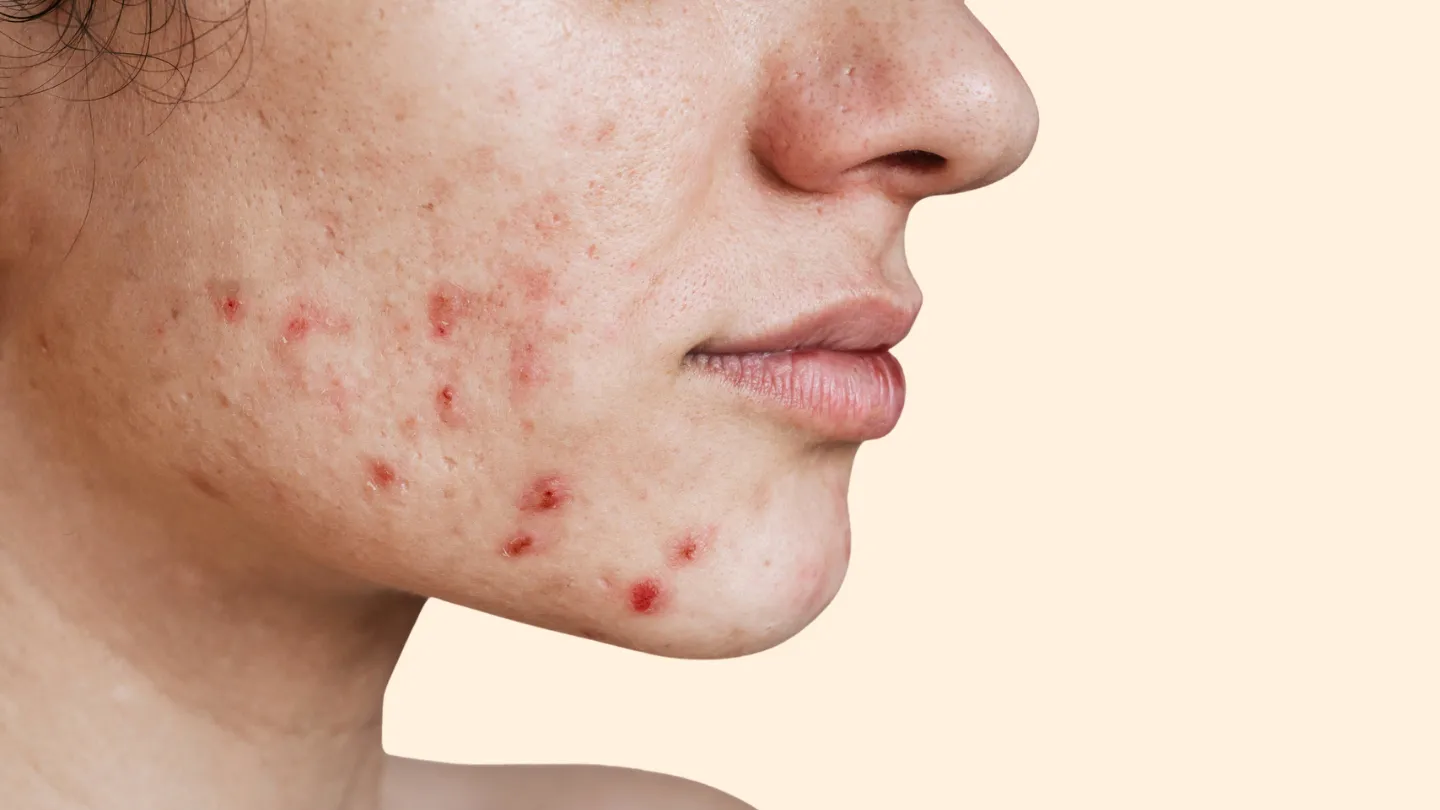Understanding Butt Acne and Its Scars
Acne can occur anywhere on the body where there are hair follicles and skin glands. The buttocks area is prone to various types of acne, including pimples, cystic acne, boils, and folliculitis (inflammation of hair follicles). These blemishes often leave behind dark marks, red spots, or textured scars after they heal.
Acne on the buttocks forms when dead skin cells, bacteria, and sebum become trapped within hair follicles. The most common causes include:
- Excess sebum production
- Bacterial growth
- Sweat and friction from clothing
- Hormonal changes
Picking and popping pimples can also worsen scarring. Scars form because damaged skin struggles to repair itself. Healing may produce too much or too little collagen, altering skin texture.
Types of Butt Acne Scars
Common types of scarring from butt acne include:
- Ice pick scars - Narrow, deep pits in the skin
- Boxscar scars - Broad depressions with sharply defined edges
- Rolling scars - Shallow indentations from bands of scar tissue
- Hyperpigmentation - Dark spots from excess melanin production
- Hypopigmentation - White spots from lack of melanin
Preventing Butt Acne Scars
While new breakouts can be difficult to avoid entirely, taking preventative measures can reduce recurrence and limit scarring:
- Wear loose, breathable fabrics such as cotton
- Wash regularly with antimicrobial cleanser
- Avoid excessive sweating and friction
- Use benzoyl peroxide spot treatment
- Don't pop or pick pimples
- See a dermatologist for underlying conditions
Lifestyle Changes
Making adjustments to hygiene, clothing, and habits can also discourage butt acne from forming:
- Wear loose-fitting clothes
- Wash and change underwear daily
- Shower immediately after exercise
- Use gentle, fragrance-free skin care
- Sanitize gym equipment before and after use
Medical Treatments
For chronic or severe cases of butt acne, prescription medications or procedures may be necessary:
- Oral antibiotics
- Hormonal therapies
- Steroid injections
- Laser therapy
- Chemical peels
Consulting a dermatologist can help diagnose the cause and craft an effective treatment plan.
How to Get Rid of Butt Acne Scars
Treating existing butt acne scars takes time, diligence, and careful skin care. Some popular scar removal options include:
Over-the-Counter Creams
Ointments with vitamin E, vitamin C, hydroquinone, retinol, or alpha hydroxy acids (AHA) may improve scar appearance. However, results are modest for severe scarring.
Home Remedies
Natural ingredients like lemon juice, aloe vera, honey, and apple cider vinegar contain compounds that can lighten marks. Mix with water and apply to help fade pigmentation.
Chemical Peels
Chemical peel solutions use acidic ingredients like glycolic acid, salicylic acid, or trichloroacetic acid to remove scarred skin layers. Mild scarring shows more improvement than severely pitted texture changes.
Laser Resurfacing
Ablative and non-ablative lasers burn through damaged skin tissue while leaving healthy tissue intact. This process boosts collagen production to smooth and resurface the skin.
Microneedling
During this procedure, the dermatologist uses a specialized pen device with tiny needle tips to puncture the skin. Controlled micro-injuries prompt the body to fill indentations with new collagen.
Surgical Excision
As a last resort for stubborn, raised scars, a plastic surgeon may surgically cut out the scar tissue. Stitches close the wound, and new skin grows to fill the gap.
Corticosteroid Injections
Steroid injections deliver anti-inflammatory medication directly into scar tissue. This helps flatten and soften associated redness, pain, and hardness.
What Results to Expect When Removing Butt Acne Scars
The extent of scar remodeling from acne depends on:
- Scar characteristics size, depth, and duration
- Skin type and age
- Treatment intensity and consistency
- Lifestyle factors sun exposure, smoking, diet
Mild discoloration and textural changes fade more easily than widespread indentations from cystic acne. Completely erasing severe scarring is very difficult, if not impossible. Proper skin care can continue improving scar appearance over 1-2 years.
Set Realistic Expectations
While treatments can enhance skin texture and tone, smooth flaws, and minimize discoloration, some remnants may always be slightly visible up close. Having realistic expectations prevents disappointment later on.
Consistency Is Key
Whether using topical creams or undergoing clinical procedures, sticking to the treatment plan is vital. Stopping treatments early can slow or reverse results.
Prevention Is Ideal
Avoiding new breakouts and additional damage altogether is the best tactic. It also limits potential irritation or side effects from scar treatment.
Budget for Multiple Options
Layering different remedies often brings better success. Budgeting appropriately for various products and procedures avoids financial barriers.
Takeaways
- Butt acne can leave behind pigmentation, dents, bumps, and other texture changes.
- Preventing blemishes limits subsequent damage and scarring risk.
- OTC creams, chemical peels, microneedling, and lasers can all reduce scarring.
- Completely removing severe acne scars may not be possible.
- Using multiple modalities and budgeting accordingly brings optimal results.
FAQs
What causes butt acne?
Common culprits behind butt acne include excess sebum production, friction from clothing, bacterial growth, hormonal changes, clogged pores, and inflammation around hair follicles.
How can I prevent butt acne scars?
Preventing new breakouts in the first place limits damage and scarring. Avoiding friction with loose clothing, washing regularly, using acne spot treatment, and seeing a dermatologist for underlying issues can all help.
What is the fastest way to get rid of butt acne scars?
Professional treatments like laser resurfacing, microneedling, chemical peels, steroid injections, and surgical excision work more quickly than home remedies. However, multiple sessions are usually needed for best results.
What should I avoid when trying to fade butt acne scars?
Picking and scratching blemishes can worsen scarring. Other things to avoid include wearing tight clothing, excessive sweating, harsh skin care products, smoking, and sun exposure while undergoing treatment.
Disclaimer: This article is for informational purposes only and does not constitute medical advice. Always consult with a healthcare professional before starting any new treatment regimen.
Related Coverage
Learn what causes lip zits and how to get rid of them fast using warm compresses, OTC creams, antibiotics, lifestyle changes and dermatologist treatments....
Butt acne scars often leave behind dark spots, redness and uneven texture. Preventing blemishes can limit damage. Using OTC creams, chemical peels and microneedling may help reduce the appearance of scarring over time....
Treating teen acne requires proper cleansing, OTC/prescription medications, lifestyle adjustments, and scar treatment. See a dermatologist for severe cases....
Learn what causes clogged pores on feet and how to unclog them. Discover home remedies, medical treatments and key prevention tips for clearing foot blackheads....
Bacne or back acne often responds well to over-the-counter washes, but severe cases may need prescription medications, professional extractions, lasers, peels, and microneedling to clear skin and minimize scarring....
Can sugary sodas lead to more acne? Ingredients like sugar and caffeine may spike hormones, inflammation, and sebum production. Learn what the research says....
If your acne is painfully itchy, inflammation and bacteria trapped in clogged pores may be to blame. Discover ways to treat irritation and prevent future breakouts....
Big painful zits under the skin can be annoying and unsightly. Learn what causes them, when to pop them, and proven home remedies and professional treatments....
Does smoking weed cause acne? Find out what science, experts, and real users say about marijuana and skin, plus tips if weed makes your acne worse....
Learn what causes clogged pores and how to treat them. Discover tips for preventing clogs plus see images of clogged pores on the face, back and chest....







